Applied Research: Management Motivation and Employee Retention Study
VerifiedAdded on 2022/10/19
|13
|3638
|84
Report
AI Summary
This report presents an analysis of how management motivation impacts employee retention within the hospitality sector. The study is divided into two parts, each examining a specific research question. Part A focuses on the role of management motivation in retaining employees, utilizing qualitative research methods. It explores the research paradigm (constructivism), methodology, sampling techniques (purposive sampling), data collection methods (interviews and document analysis), and data analysis techniques (diagnostic data analysis) used in the selected research article. The report evaluates the strengths and weaknesses of the research framework. Part B investigates the impact of employee satisfaction on hospitality performance, employing quantitative research. It discusses the research paradigm (pragmatism), methodology, sampling methods (probability sampling), data collection methods, and data analysis techniques. The report aims to provide insights into effective strategies for employee retention and improved hospitality performance, drawing on existing research and analysis.

Management
Student Details
9/21/2019
Student Details
9/21/2019
Paraphrase This Document
Need a fresh take? Get an instant paraphrase of this document with our AI Paraphraser
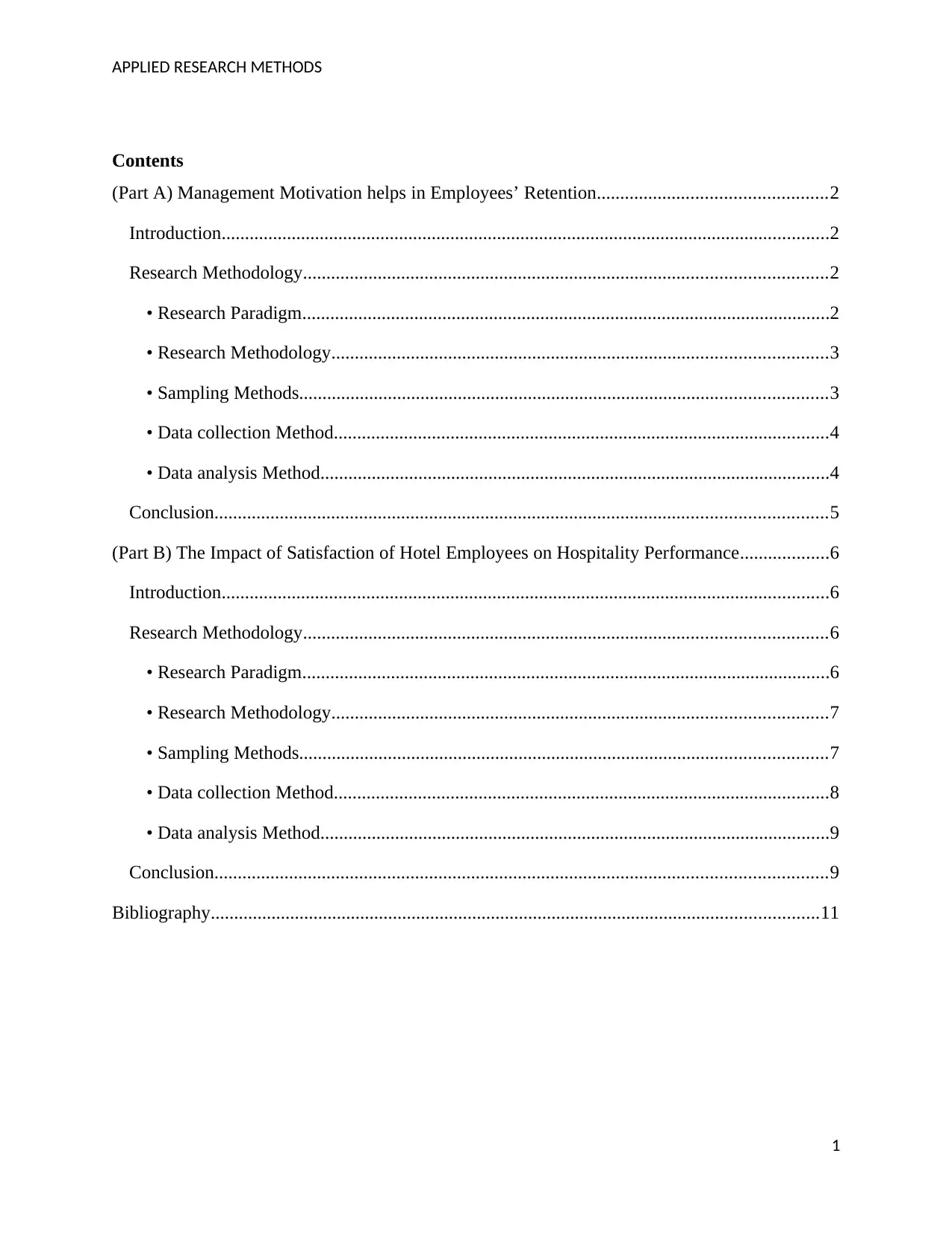
APPLIED RESEARCH METHODS
Contents
(Part A) Management Motivation helps in Employees’ Retention.................................................2
Introduction..................................................................................................................................2
Research Methodology................................................................................................................2
• Research Paradigm.................................................................................................................2
• Research Methodology..........................................................................................................3
• Sampling Methods.................................................................................................................3
• Data collection Method..........................................................................................................4
• Data analysis Method.............................................................................................................4
Conclusion...................................................................................................................................5
(Part B) The Impact of Satisfaction of Hotel Employees on Hospitality Performance...................6
Introduction..................................................................................................................................6
Research Methodology................................................................................................................6
• Research Paradigm.................................................................................................................6
• Research Methodology..........................................................................................................7
• Sampling Methods.................................................................................................................7
• Data collection Method..........................................................................................................8
• Data analysis Method.............................................................................................................9
Conclusion...................................................................................................................................9
Bibliography..................................................................................................................................11
1
Contents
(Part A) Management Motivation helps in Employees’ Retention.................................................2
Introduction..................................................................................................................................2
Research Methodology................................................................................................................2
• Research Paradigm.................................................................................................................2
• Research Methodology..........................................................................................................3
• Sampling Methods.................................................................................................................3
• Data collection Method..........................................................................................................4
• Data analysis Method.............................................................................................................4
Conclusion...................................................................................................................................5
(Part B) The Impact of Satisfaction of Hotel Employees on Hospitality Performance...................6
Introduction..................................................................................................................................6
Research Methodology................................................................................................................6
• Research Paradigm.................................................................................................................6
• Research Methodology..........................................................................................................7
• Sampling Methods.................................................................................................................7
• Data collection Method..........................................................................................................8
• Data analysis Method.............................................................................................................9
Conclusion...................................................................................................................................9
Bibliography..................................................................................................................................11
1
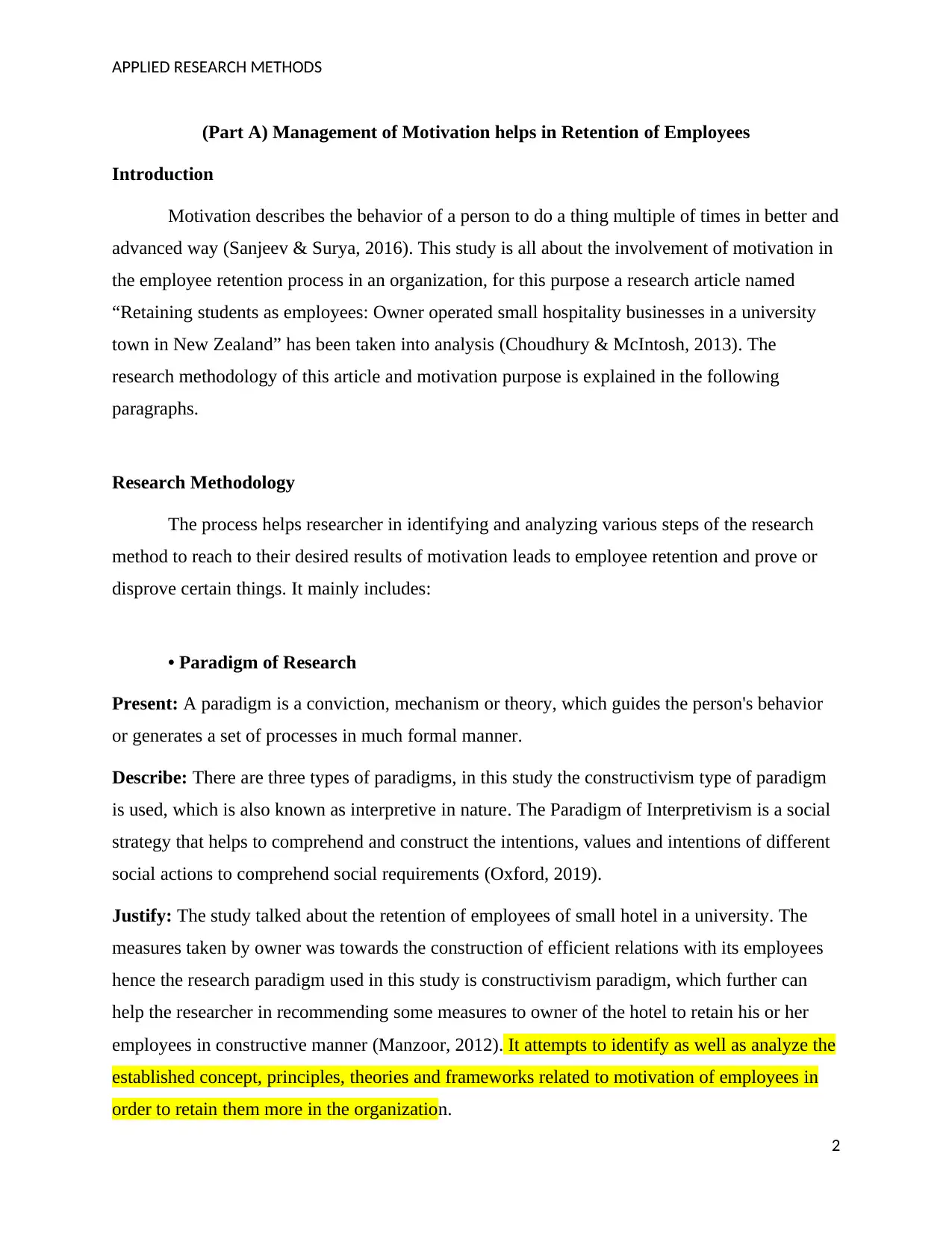
APPLIED RESEARCH METHODS
(Part A) Management of Motivation helps in Retention of Employees
Introduction
Motivation describes the behavior of a person to do a thing multiple of times in better and
advanced way (Sanjeev & Surya, 2016). This study is all about the involvement of motivation in
the employee retention process in an organization, for this purpose a research article named
“Retaining students as employees: Owner operated small hospitality businesses in a university
town in New Zealand” has been taken into analysis (Choudhury & McIntosh, 2013). The
research methodology of this article and motivation purpose is explained in the following
paragraphs.
Research Methodology
The process helps researcher in identifying and analyzing various steps of the research
method to reach to their desired results of motivation leads to employee retention and prove or
disprove certain things. It mainly includes:
• Paradigm of Research
Present: A paradigm is a conviction, mechanism or theory, which guides the person's behavior
or generates a set of processes in much formal manner.
Describe: There are three types of paradigms, in this study the constructivism type of paradigm
is used, which is also known as interpretive in nature. The Paradigm of Interpretivism is a social
strategy that helps to comprehend and construct the intentions, values and intentions of different
social actions to comprehend social requirements (Oxford, 2019).
Justify: The study talked about the retention of employees of small hotel in a university. The
measures taken by owner was towards the construction of efficient relations with its employees
hence the research paradigm used in this study is constructivism paradigm, which further can
help the researcher in recommending some measures to owner of the hotel to retain his or her
employees in constructive manner (Manzoor, 2012). It attempts to identify as well as analyze the
established concept, principles, theories and frameworks related to motivation of employees in
order to retain them more in the organization.
2
(Part A) Management of Motivation helps in Retention of Employees
Introduction
Motivation describes the behavior of a person to do a thing multiple of times in better and
advanced way (Sanjeev & Surya, 2016). This study is all about the involvement of motivation in
the employee retention process in an organization, for this purpose a research article named
“Retaining students as employees: Owner operated small hospitality businesses in a university
town in New Zealand” has been taken into analysis (Choudhury & McIntosh, 2013). The
research methodology of this article and motivation purpose is explained in the following
paragraphs.
Research Methodology
The process helps researcher in identifying and analyzing various steps of the research
method to reach to their desired results of motivation leads to employee retention and prove or
disprove certain things. It mainly includes:
• Paradigm of Research
Present: A paradigm is a conviction, mechanism or theory, which guides the person's behavior
or generates a set of processes in much formal manner.
Describe: There are three types of paradigms, in this study the constructivism type of paradigm
is used, which is also known as interpretive in nature. The Paradigm of Interpretivism is a social
strategy that helps to comprehend and construct the intentions, values and intentions of different
social actions to comprehend social requirements (Oxford, 2019).
Justify: The study talked about the retention of employees of small hotel in a university. The
measures taken by owner was towards the construction of efficient relations with its employees
hence the research paradigm used in this study is constructivism paradigm, which further can
help the researcher in recommending some measures to owner of the hotel to retain his or her
employees in constructive manner (Manzoor, 2012). It attempts to identify as well as analyze the
established concept, principles, theories and frameworks related to motivation of employees in
order to retain them more in the organization.
2
⊘ This is a preview!⊘
Do you want full access?
Subscribe today to unlock all pages.

Trusted by 1+ million students worldwide
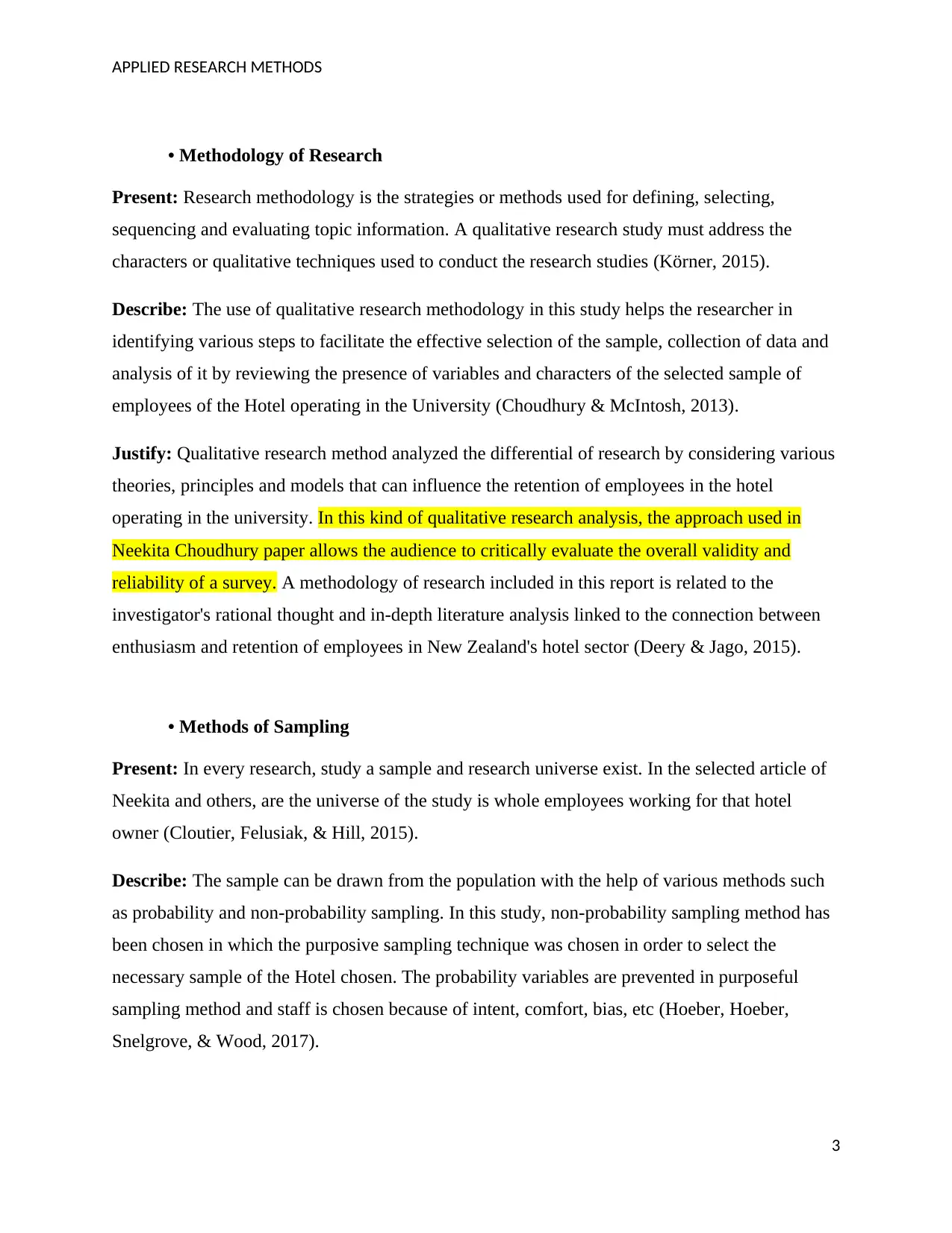
APPLIED RESEARCH METHODS
• Methodology of Research
Present: Research methodology is the strategies or methods used for defining, selecting,
sequencing and evaluating topic information. A qualitative research study must address the
characters or qualitative techniques used to conduct the research studies (Körner, 2015).
Describe: The use of qualitative research methodology in this study helps the researcher in
identifying various steps to facilitate the effective selection of the sample, collection of data and
analysis of it by reviewing the presence of variables and characters of the selected sample of
employees of the Hotel operating in the University (Choudhury & McIntosh, 2013).
Justify: Qualitative research method analyzed the differential of research by considering various
theories, principles and models that can influence the retention of employees in the hotel
operating in the university. In this kind of qualitative research analysis, the approach used in
Neekita Choudhury paper allows the audience to critically evaluate the overall validity and
reliability of a survey. A methodology of research included in this report is related to the
investigator's rational thought and in-depth literature analysis linked to the connection between
enthusiasm and retention of employees in New Zealand's hotel sector (Deery & Jago, 2015).
• Methods of Sampling
Present: In every research, study a sample and research universe exist. In the selected article of
Neekita and others, are the universe of the study is whole employees working for that hotel
owner (Cloutier, Felusiak, & Hill, 2015).
Describe: The sample can be drawn from the population with the help of various methods such
as probability and non-probability sampling. In this study, non-probability sampling method has
been chosen in which the purposive sampling technique was chosen in order to select the
necessary sample of the Hotel chosen. The probability variables are prevented in purposeful
sampling method and staff is chosen because of intent, comfort, bias, etc (Hoeber, Hoeber,
Snelgrove, & Wood, 2017).
3
• Methodology of Research
Present: Research methodology is the strategies or methods used for defining, selecting,
sequencing and evaluating topic information. A qualitative research study must address the
characters or qualitative techniques used to conduct the research studies (Körner, 2015).
Describe: The use of qualitative research methodology in this study helps the researcher in
identifying various steps to facilitate the effective selection of the sample, collection of data and
analysis of it by reviewing the presence of variables and characters of the selected sample of
employees of the Hotel operating in the University (Choudhury & McIntosh, 2013).
Justify: Qualitative research method analyzed the differential of research by considering various
theories, principles and models that can influence the retention of employees in the hotel
operating in the university. In this kind of qualitative research analysis, the approach used in
Neekita Choudhury paper allows the audience to critically evaluate the overall validity and
reliability of a survey. A methodology of research included in this report is related to the
investigator's rational thought and in-depth literature analysis linked to the connection between
enthusiasm and retention of employees in New Zealand's hotel sector (Deery & Jago, 2015).
• Methods of Sampling
Present: In every research, study a sample and research universe exist. In the selected article of
Neekita and others, are the universe of the study is whole employees working for that hotel
owner (Cloutier, Felusiak, & Hill, 2015).
Describe: The sample can be drawn from the population with the help of various methods such
as probability and non-probability sampling. In this study, non-probability sampling method has
been chosen in which the purposive sampling technique was chosen in order to select the
necessary sample of the Hotel chosen. The probability variables are prevented in purposeful
sampling method and staff is chosen because of intent, comfort, bias, etc (Hoeber, Hoeber,
Snelgrove, & Wood, 2017).
3
Paraphrase This Document
Need a fresh take? Get an instant paraphrase of this document with our AI Paraphraser
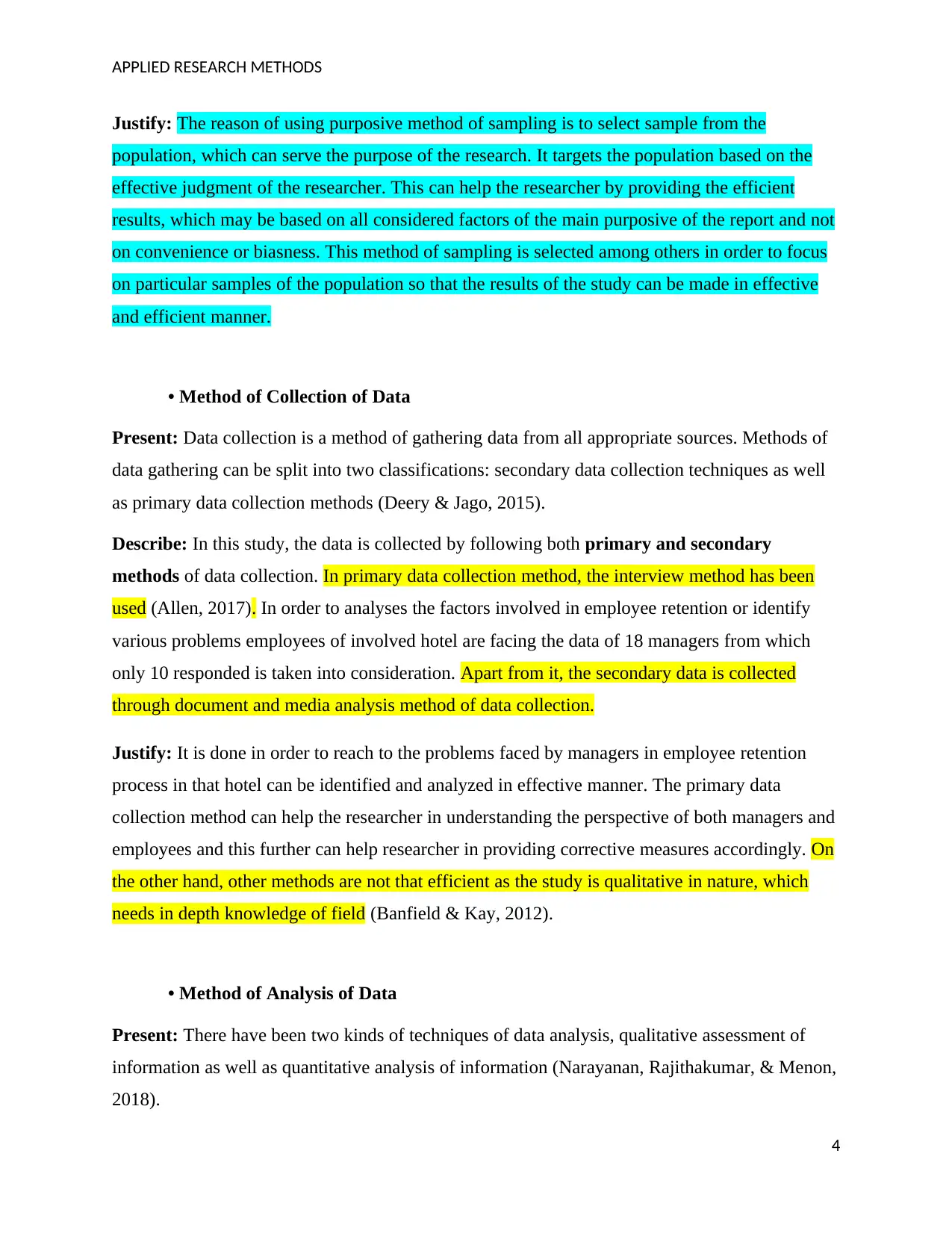
APPLIED RESEARCH METHODS
Justify: The reason of using purposive method of sampling is to select sample from the
population, which can serve the purpose of the research. It targets the population based on the
effective judgment of the researcher. This can help the researcher by providing the efficient
results, which may be based on all considered factors of the main purposive of the report and not
on convenience or biasness. This method of sampling is selected among others in order to focus
on particular samples of the population so that the results of the study can be made in effective
and efficient manner.
• Method of Collection of Data
Present: Data collection is a method of gathering data from all appropriate sources. Methods of
data gathering can be split into two classifications: secondary data collection techniques as well
as primary data collection methods (Deery & Jago, 2015).
Describe: In this study, the data is collected by following both primary and secondary
methods of data collection. In primary data collection method, the interview method has been
used (Allen, 2017). In order to analyses the factors involved in employee retention or identify
various problems employees of involved hotel are facing the data of 18 managers from which
only 10 responded is taken into consideration. Apart from it, the secondary data is collected
through document and media analysis method of data collection.
Justify: It is done in order to reach to the problems faced by managers in employee retention
process in that hotel can be identified and analyzed in effective manner. The primary data
collection method can help the researcher in understanding the perspective of both managers and
employees and this further can help researcher in providing corrective measures accordingly. On
the other hand, other methods are not that efficient as the study is qualitative in nature, which
needs in depth knowledge of field (Banfield & Kay, 2012).
• Method of Analysis of Data
Present: There have been two kinds of techniques of data analysis, qualitative assessment of
information as well as quantitative analysis of information (Narayanan, Rajithakumar, & Menon,
2018).
4
Justify: The reason of using purposive method of sampling is to select sample from the
population, which can serve the purpose of the research. It targets the population based on the
effective judgment of the researcher. This can help the researcher by providing the efficient
results, which may be based on all considered factors of the main purposive of the report and not
on convenience or biasness. This method of sampling is selected among others in order to focus
on particular samples of the population so that the results of the study can be made in effective
and efficient manner.
• Method of Collection of Data
Present: Data collection is a method of gathering data from all appropriate sources. Methods of
data gathering can be split into two classifications: secondary data collection techniques as well
as primary data collection methods (Deery & Jago, 2015).
Describe: In this study, the data is collected by following both primary and secondary
methods of data collection. In primary data collection method, the interview method has been
used (Allen, 2017). In order to analyses the factors involved in employee retention or identify
various problems employees of involved hotel are facing the data of 18 managers from which
only 10 responded is taken into consideration. Apart from it, the secondary data is collected
through document and media analysis method of data collection.
Justify: It is done in order to reach to the problems faced by managers in employee retention
process in that hotel can be identified and analyzed in effective manner. The primary data
collection method can help the researcher in understanding the perspective of both managers and
employees and this further can help researcher in providing corrective measures accordingly. On
the other hand, other methods are not that efficient as the study is qualitative in nature, which
needs in depth knowledge of field (Banfield & Kay, 2012).
• Method of Analysis of Data
Present: There have been two kinds of techniques of data analysis, qualitative assessment of
information as well as quantitative analysis of information (Narayanan, Rajithakumar, & Menon,
2018).
4
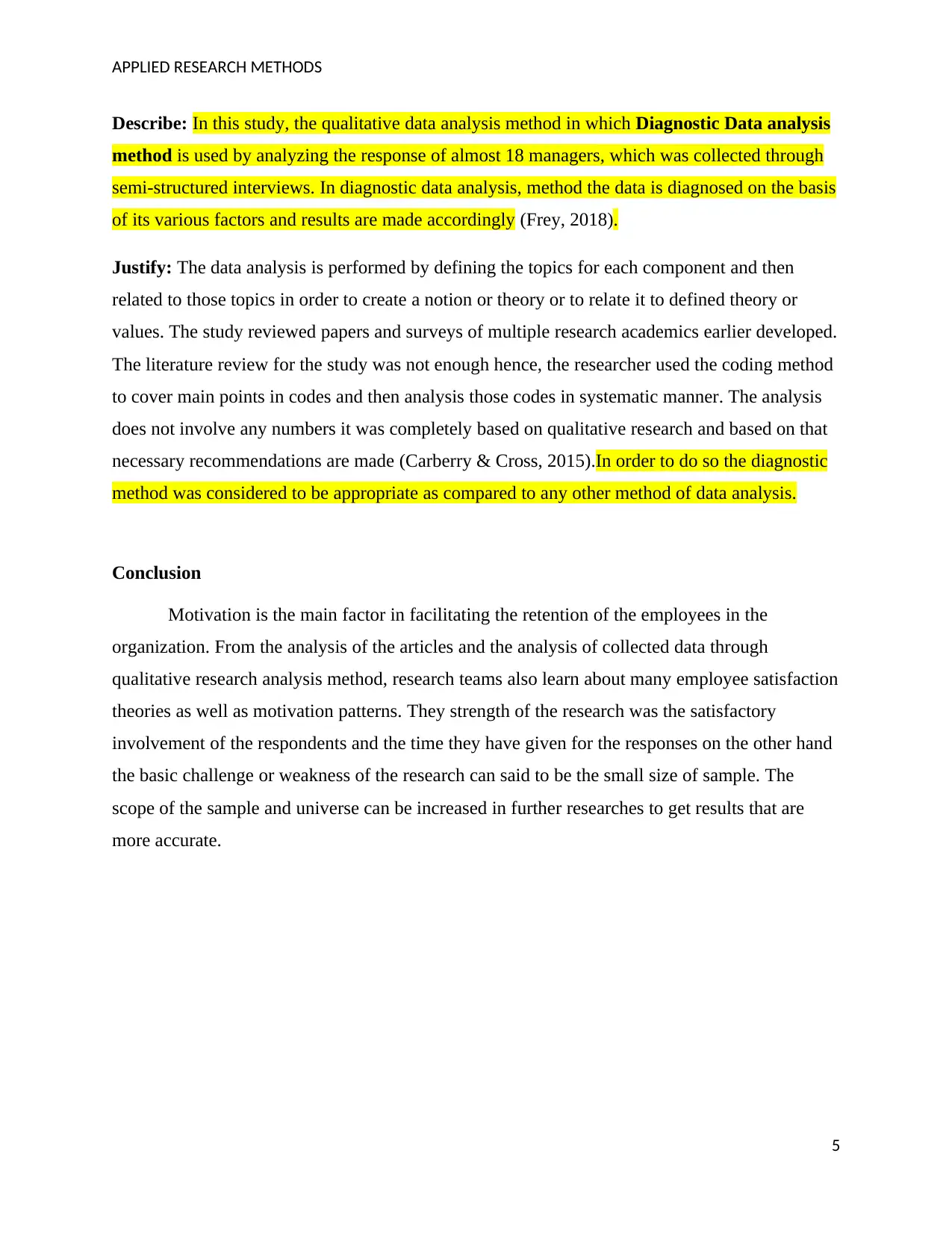
APPLIED RESEARCH METHODS
Describe: In this study, the qualitative data analysis method in which Diagnostic Data analysis
method is used by analyzing the response of almost 18 managers, which was collected through
semi-structured interviews. In diagnostic data analysis, method the data is diagnosed on the basis
of its various factors and results are made accordingly (Frey, 2018).
Justify: The data analysis is performed by defining the topics for each component and then
related to those topics in order to create a notion or theory or to relate it to defined theory or
values. The study reviewed papers and surveys of multiple research academics earlier developed.
The literature review for the study was not enough hence, the researcher used the coding method
to cover main points in codes and then analysis those codes in systematic manner. The analysis
does not involve any numbers it was completely based on qualitative research and based on that
necessary recommendations are made (Carberry & Cross, 2015).In order to do so the diagnostic
method was considered to be appropriate as compared to any other method of data analysis.
Conclusion
Motivation is the main factor in facilitating the retention of the employees in the
organization. From the analysis of the articles and the analysis of collected data through
qualitative research analysis method, research teams also learn about many employee satisfaction
theories as well as motivation patterns. They strength of the research was the satisfactory
involvement of the respondents and the time they have given for the responses on the other hand
the basic challenge or weakness of the research can said to be the small size of sample. The
scope of the sample and universe can be increased in further researches to get results that are
more accurate.
5
Describe: In this study, the qualitative data analysis method in which Diagnostic Data analysis
method is used by analyzing the response of almost 18 managers, which was collected through
semi-structured interviews. In diagnostic data analysis, method the data is diagnosed on the basis
of its various factors and results are made accordingly (Frey, 2018).
Justify: The data analysis is performed by defining the topics for each component and then
related to those topics in order to create a notion or theory or to relate it to defined theory or
values. The study reviewed papers and surveys of multiple research academics earlier developed.
The literature review for the study was not enough hence, the researcher used the coding method
to cover main points in codes and then analysis those codes in systematic manner. The analysis
does not involve any numbers it was completely based on qualitative research and based on that
necessary recommendations are made (Carberry & Cross, 2015).In order to do so the diagnostic
method was considered to be appropriate as compared to any other method of data analysis.
Conclusion
Motivation is the main factor in facilitating the retention of the employees in the
organization. From the analysis of the articles and the analysis of collected data through
qualitative research analysis method, research teams also learn about many employee satisfaction
theories as well as motivation patterns. They strength of the research was the satisfactory
involvement of the respondents and the time they have given for the responses on the other hand
the basic challenge or weakness of the research can said to be the small size of sample. The
scope of the sample and universe can be increased in further researches to get results that are
more accurate.
5
⊘ This is a preview!⊘
Do you want full access?
Subscribe today to unlock all pages.

Trusted by 1+ million students worldwide
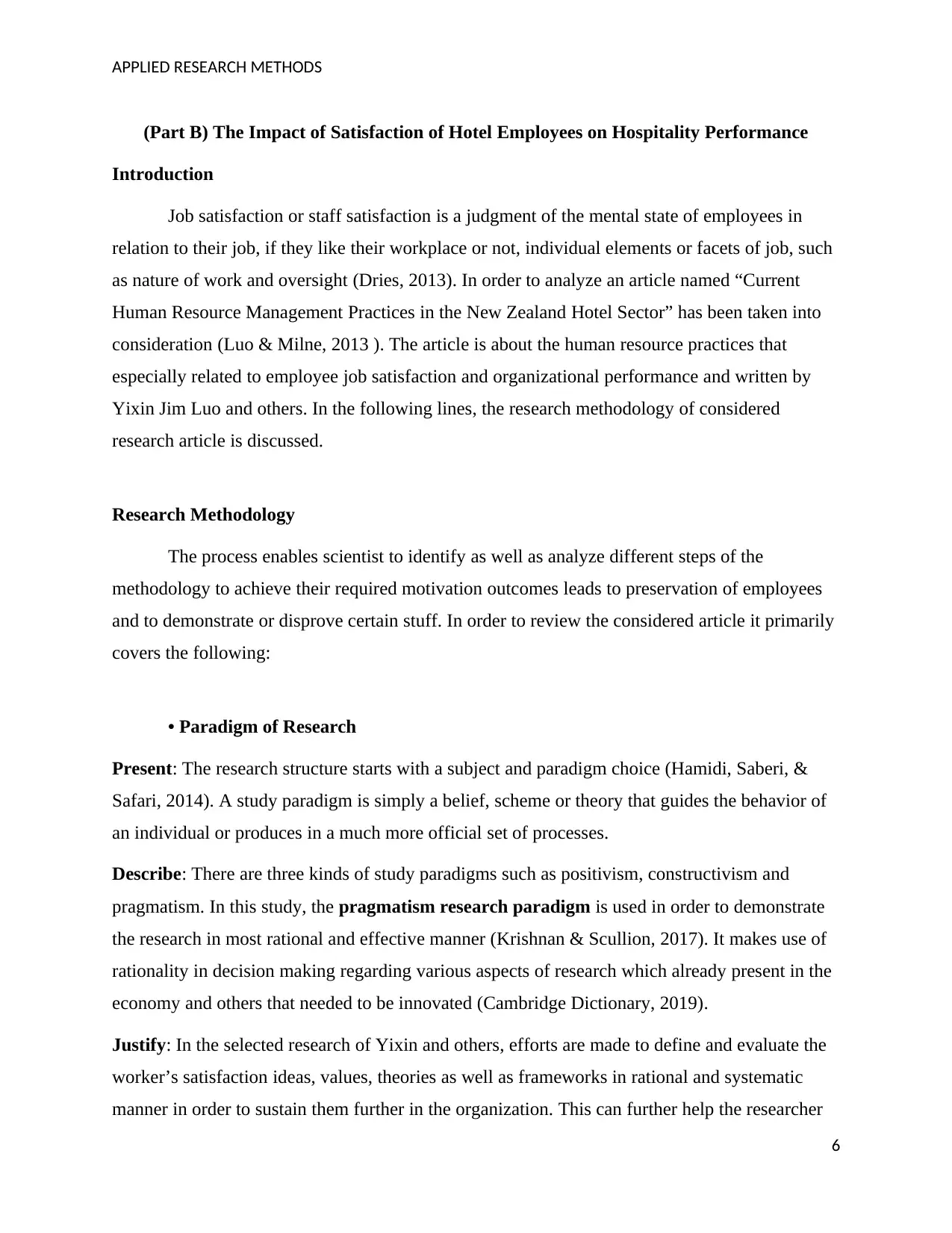
APPLIED RESEARCH METHODS
(Part B) The Impact of Satisfaction of Hotel Employees on Hospitality Performance
Introduction
Job satisfaction or staff satisfaction is a judgment of the mental state of employees in
relation to their job, if they like their workplace or not, individual elements or facets of job, such
as nature of work and oversight (Dries, 2013). In order to analyze an article named “Current
Human Resource Management Practices in the New Zealand Hotel Sector” has been taken into
consideration (Luo & Milne, 2013 ). The article is about the human resource practices that
especially related to employee job satisfaction and organizational performance and written by
Yixin Jim Luo and others. In the following lines, the research methodology of considered
research article is discussed.
Research Methodology
The process enables scientist to identify as well as analyze different steps of the
methodology to achieve their required motivation outcomes leads to preservation of employees
and to demonstrate or disprove certain stuff. In order to review the considered article it primarily
covers the following:
• Paradigm of Research
Present: The research structure starts with a subject and paradigm choice (Hamidi, Saberi, &
Safari, 2014). A study paradigm is simply a belief, scheme or theory that guides the behavior of
an individual or produces in a much more official set of processes.
Describe: There are three kinds of study paradigms such as positivism, constructivism and
pragmatism. In this study, the pragmatism research paradigm is used in order to demonstrate
the research in most rational and effective manner (Krishnan & Scullion, 2017). It makes use of
rationality in decision making regarding various aspects of research which already present in the
economy and others that needed to be innovated (Cambridge Dictionary, 2019).
Justify: In the selected research of Yixin and others, efforts are made to define and evaluate the
worker’s satisfaction ideas, values, theories as well as frameworks in rational and systematic
manner in order to sustain them further in the organization. This can further help the researcher
6
(Part B) The Impact of Satisfaction of Hotel Employees on Hospitality Performance
Introduction
Job satisfaction or staff satisfaction is a judgment of the mental state of employees in
relation to their job, if they like their workplace or not, individual elements or facets of job, such
as nature of work and oversight (Dries, 2013). In order to analyze an article named “Current
Human Resource Management Practices in the New Zealand Hotel Sector” has been taken into
consideration (Luo & Milne, 2013 ). The article is about the human resource practices that
especially related to employee job satisfaction and organizational performance and written by
Yixin Jim Luo and others. In the following lines, the research methodology of considered
research article is discussed.
Research Methodology
The process enables scientist to identify as well as analyze different steps of the
methodology to achieve their required motivation outcomes leads to preservation of employees
and to demonstrate or disprove certain stuff. In order to review the considered article it primarily
covers the following:
• Paradigm of Research
Present: The research structure starts with a subject and paradigm choice (Hamidi, Saberi, &
Safari, 2014). A study paradigm is simply a belief, scheme or theory that guides the behavior of
an individual or produces in a much more official set of processes.
Describe: There are three kinds of study paradigms such as positivism, constructivism and
pragmatism. In this study, the pragmatism research paradigm is used in order to demonstrate
the research in most rational and effective manner (Krishnan & Scullion, 2017). It makes use of
rationality in decision making regarding various aspects of research which already present in the
economy and others that needed to be innovated (Cambridge Dictionary, 2019).
Justify: In the selected research of Yixin and others, efforts are made to define and evaluate the
worker’s satisfaction ideas, values, theories as well as frameworks in rational and systematic
manner in order to sustain them further in the organization. This can further help the researcher
6
Paraphrase This Document
Need a fresh take? Get an instant paraphrase of this document with our AI Paraphraser
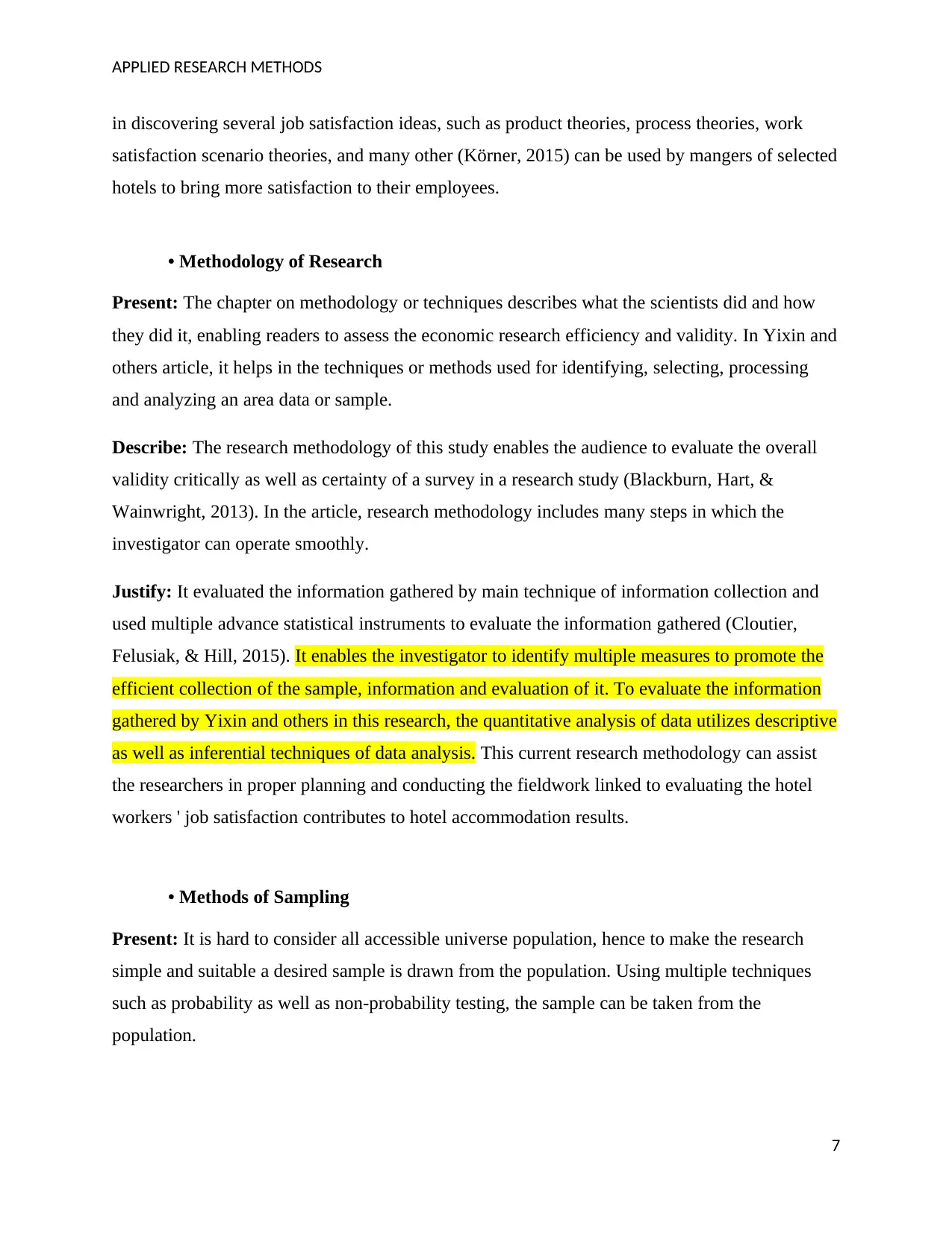
APPLIED RESEARCH METHODS
in discovering several job satisfaction ideas, such as product theories, process theories, work
satisfaction scenario theories, and many other (Körner, 2015) can be used by mangers of selected
hotels to bring more satisfaction to their employees.
• Methodology of Research
Present: The chapter on methodology or techniques describes what the scientists did and how
they did it, enabling readers to assess the economic research efficiency and validity. In Yixin and
others article, it helps in the techniques or methods used for identifying, selecting, processing
and analyzing an area data or sample.
Describe: The research methodology of this study enables the audience to evaluate the overall
validity critically as well as certainty of a survey in a research study (Blackburn, Hart, &
Wainwright, 2013). In the article, research methodology includes many steps in which the
investigator can operate smoothly.
Justify: It evaluated the information gathered by main technique of information collection and
used multiple advance statistical instruments to evaluate the information gathered (Cloutier,
Felusiak, & Hill, 2015). It enables the investigator to identify multiple measures to promote the
efficient collection of the sample, information and evaluation of it. To evaluate the information
gathered by Yixin and others in this research, the quantitative analysis of data utilizes descriptive
as well as inferential techniques of data analysis. This current research methodology can assist
the researchers in proper planning and conducting the fieldwork linked to evaluating the hotel
workers ' job satisfaction contributes to hotel accommodation results.
• Methods of Sampling
Present: It is hard to consider all accessible universe population, hence to make the research
simple and suitable a desired sample is drawn from the population. Using multiple techniques
such as probability as well as non-probability testing, the sample can be taken from the
population.
7
in discovering several job satisfaction ideas, such as product theories, process theories, work
satisfaction scenario theories, and many other (Körner, 2015) can be used by mangers of selected
hotels to bring more satisfaction to their employees.
• Methodology of Research
Present: The chapter on methodology or techniques describes what the scientists did and how
they did it, enabling readers to assess the economic research efficiency and validity. In Yixin and
others article, it helps in the techniques or methods used for identifying, selecting, processing
and analyzing an area data or sample.
Describe: The research methodology of this study enables the audience to evaluate the overall
validity critically as well as certainty of a survey in a research study (Blackburn, Hart, &
Wainwright, 2013). In the article, research methodology includes many steps in which the
investigator can operate smoothly.
Justify: It evaluated the information gathered by main technique of information collection and
used multiple advance statistical instruments to evaluate the information gathered (Cloutier,
Felusiak, & Hill, 2015). It enables the investigator to identify multiple measures to promote the
efficient collection of the sample, information and evaluation of it. To evaluate the information
gathered by Yixin and others in this research, the quantitative analysis of data utilizes descriptive
as well as inferential techniques of data analysis. This current research methodology can assist
the researchers in proper planning and conducting the fieldwork linked to evaluating the hotel
workers ' job satisfaction contributes to hotel accommodation results.
• Methods of Sampling
Present: It is hard to consider all accessible universe population, hence to make the research
simple and suitable a desired sample is drawn from the population. Using multiple techniques
such as probability as well as non-probability testing, the sample can be taken from the
population.
7
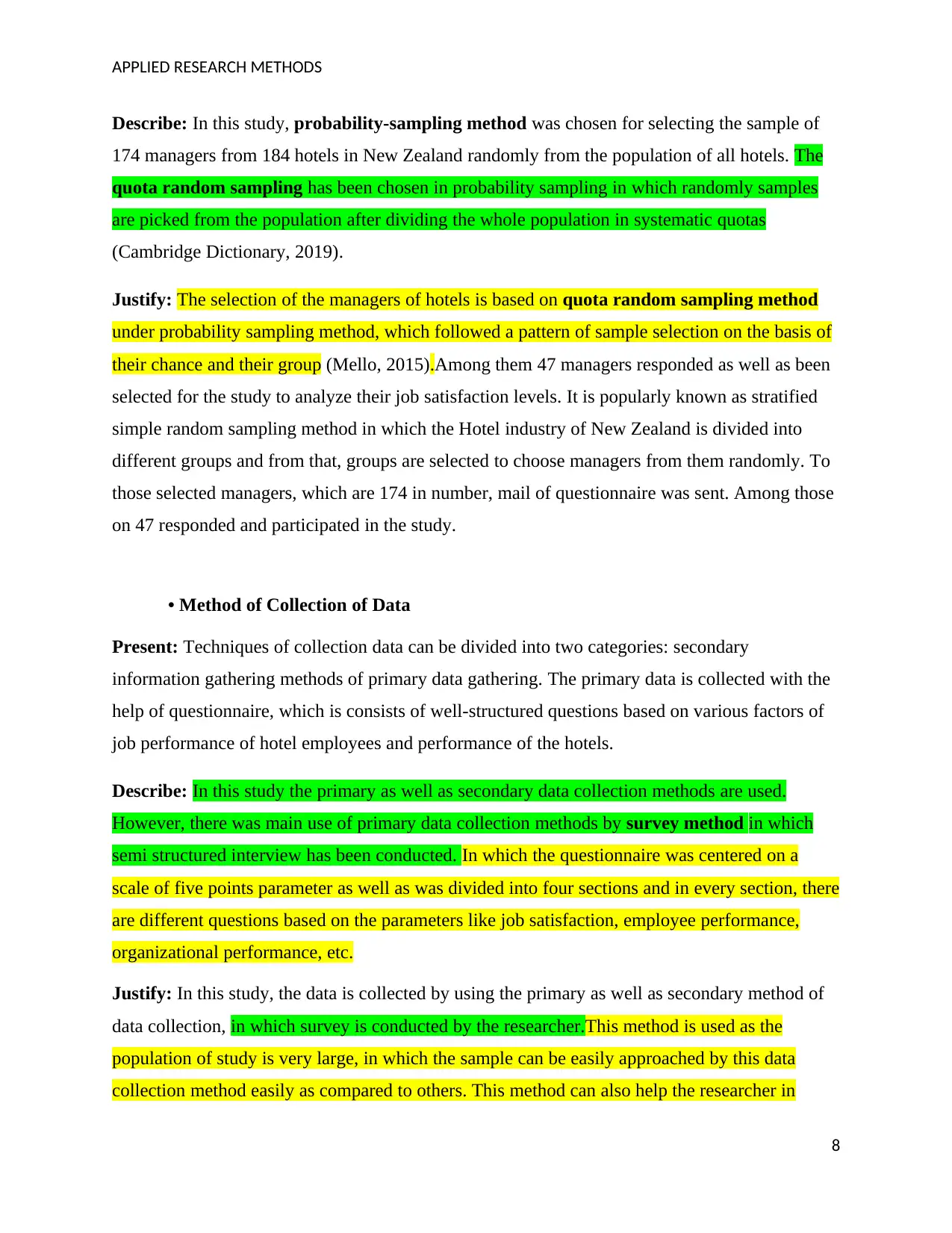
APPLIED RESEARCH METHODS
Describe: In this study, probability-sampling method was chosen for selecting the sample of
174 managers from 184 hotels in New Zealand randomly from the population of all hotels. The
quota random sampling has been chosen in probability sampling in which randomly samples
are picked from the population after dividing the whole population in systematic quotas
(Cambridge Dictionary, 2019).
Justify: The selection of the managers of hotels is based on quota random sampling method
under probability sampling method, which followed a pattern of sample selection on the basis of
their chance and their group (Mello, 2015).Among them 47 managers responded as well as been
selected for the study to analyze their job satisfaction levels. It is popularly known as stratified
simple random sampling method in which the Hotel industry of New Zealand is divided into
different groups and from that, groups are selected to choose managers from them randomly. To
those selected managers, which are 174 in number, mail of questionnaire was sent. Among those
on 47 responded and participated in the study.
• Method of Collection of Data
Present: Techniques of collection data can be divided into two categories: secondary
information gathering methods of primary data gathering. The primary data is collected with the
help of questionnaire, which is consists of well-structured questions based on various factors of
job performance of hotel employees and performance of the hotels.
Describe: In this study the primary as well as secondary data collection methods are used.
However, there was main use of primary data collection methods by survey method in which
semi structured interview has been conducted. In which the questionnaire was centered on a
scale of five points parameter as well as was divided into four sections and in every section, there
are different questions based on the parameters like job satisfaction, employee performance,
organizational performance, etc.
Justify: In this study, the data is collected by using the primary as well as secondary method of
data collection, in which survey is conducted by the researcher.This method is used as the
population of study is very large, in which the sample can be easily approached by this data
collection method easily as compared to others. This method can also help the researcher in
8
Describe: In this study, probability-sampling method was chosen for selecting the sample of
174 managers from 184 hotels in New Zealand randomly from the population of all hotels. The
quota random sampling has been chosen in probability sampling in which randomly samples
are picked from the population after dividing the whole population in systematic quotas
(Cambridge Dictionary, 2019).
Justify: The selection of the managers of hotels is based on quota random sampling method
under probability sampling method, which followed a pattern of sample selection on the basis of
their chance and their group (Mello, 2015).Among them 47 managers responded as well as been
selected for the study to analyze their job satisfaction levels. It is popularly known as stratified
simple random sampling method in which the Hotel industry of New Zealand is divided into
different groups and from that, groups are selected to choose managers from them randomly. To
those selected managers, which are 174 in number, mail of questionnaire was sent. Among those
on 47 responded and participated in the study.
• Method of Collection of Data
Present: Techniques of collection data can be divided into two categories: secondary
information gathering methods of primary data gathering. The primary data is collected with the
help of questionnaire, which is consists of well-structured questions based on various factors of
job performance of hotel employees and performance of the hotels.
Describe: In this study the primary as well as secondary data collection methods are used.
However, there was main use of primary data collection methods by survey method in which
semi structured interview has been conducted. In which the questionnaire was centered on a
scale of five points parameter as well as was divided into four sections and in every section, there
are different questions based on the parameters like job satisfaction, employee performance,
organizational performance, etc.
Justify: In this study, the data is collected by using the primary as well as secondary method of
data collection, in which survey is conducted by the researcher.This method is used as the
population of study is very large, in which the sample can be easily approached by this data
collection method easily as compared to others. This method can also help the researcher in
8
⊘ This is a preview!⊘
Do you want full access?
Subscribe today to unlock all pages.

Trusted by 1+ million students worldwide
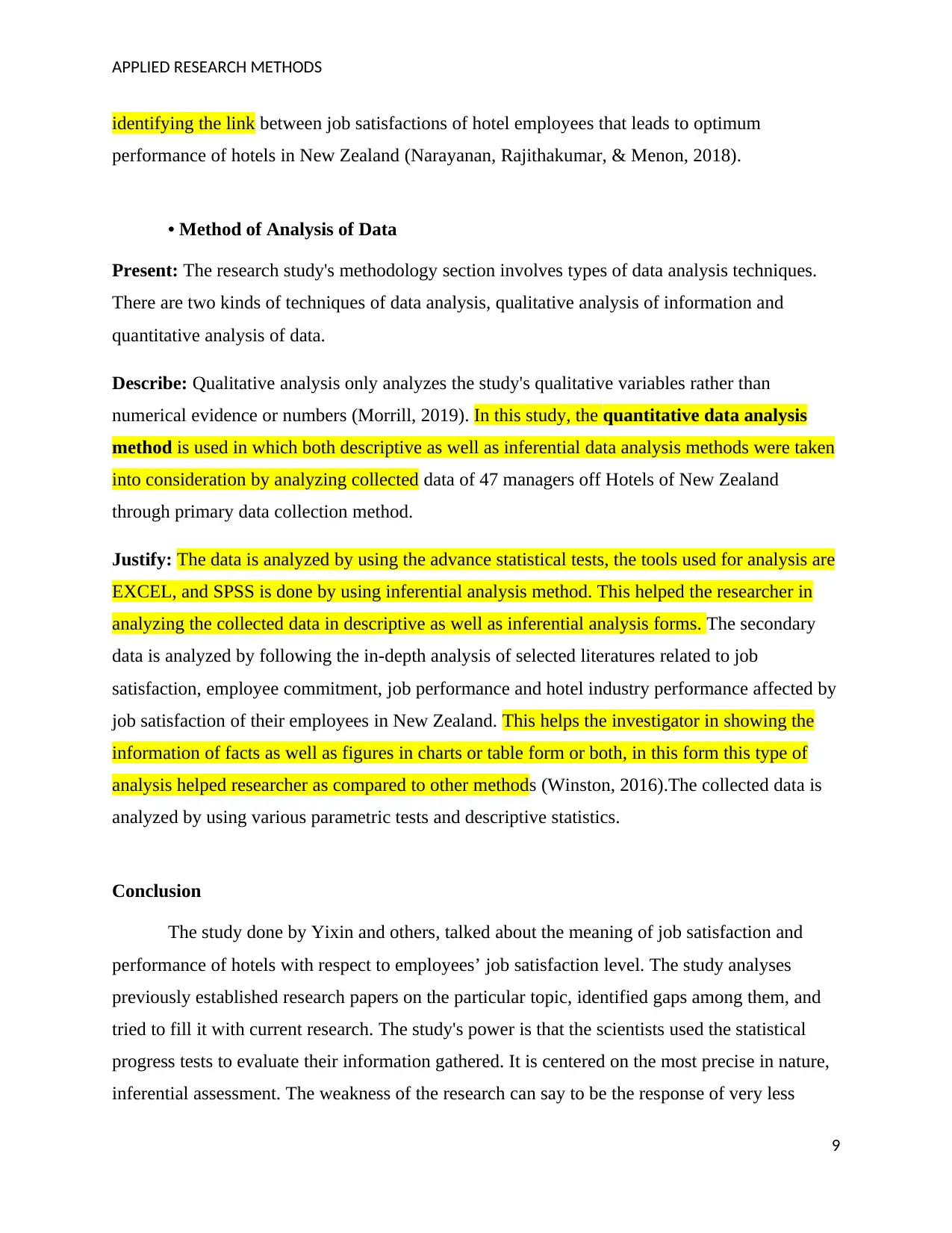
APPLIED RESEARCH METHODS
identifying the link between job satisfactions of hotel employees that leads to optimum
performance of hotels in New Zealand (Narayanan, Rajithakumar, & Menon, 2018).
• Method of Analysis of Data
Present: The research study's methodology section involves types of data analysis techniques.
There are two kinds of techniques of data analysis, qualitative analysis of information and
quantitative analysis of data.
Describe: Qualitative analysis only analyzes the study's qualitative variables rather than
numerical evidence or numbers (Morrill, 2019). In this study, the quantitative data analysis
method is used in which both descriptive as well as inferential data analysis methods were taken
into consideration by analyzing collected data of 47 managers off Hotels of New Zealand
through primary data collection method.
Justify: The data is analyzed by using the advance statistical tests, the tools used for analysis are
EXCEL, and SPSS is done by using inferential analysis method. This helped the researcher in
analyzing the collected data in descriptive as well as inferential analysis forms. The secondary
data is analyzed by following the in-depth analysis of selected literatures related to job
satisfaction, employee commitment, job performance and hotel industry performance affected by
job satisfaction of their employees in New Zealand. This helps the investigator in showing the
information of facts as well as figures in charts or table form or both, in this form this type of
analysis helped researcher as compared to other methods (Winston, 2016).The collected data is
analyzed by using various parametric tests and descriptive statistics.
Conclusion
The study done by Yixin and others, talked about the meaning of job satisfaction and
performance of hotels with respect to employees’ job satisfaction level. The study analyses
previously established research papers on the particular topic, identified gaps among them, and
tried to fill it with current research. The study's power is that the scientists used the statistical
progress tests to evaluate their information gathered. It is centered on the most precise in nature,
inferential assessment. The weakness of the research can say to be the response of very less
9
identifying the link between job satisfactions of hotel employees that leads to optimum
performance of hotels in New Zealand (Narayanan, Rajithakumar, & Menon, 2018).
• Method of Analysis of Data
Present: The research study's methodology section involves types of data analysis techniques.
There are two kinds of techniques of data analysis, qualitative analysis of information and
quantitative analysis of data.
Describe: Qualitative analysis only analyzes the study's qualitative variables rather than
numerical evidence or numbers (Morrill, 2019). In this study, the quantitative data analysis
method is used in which both descriptive as well as inferential data analysis methods were taken
into consideration by analyzing collected data of 47 managers off Hotels of New Zealand
through primary data collection method.
Justify: The data is analyzed by using the advance statistical tests, the tools used for analysis are
EXCEL, and SPSS is done by using inferential analysis method. This helped the researcher in
analyzing the collected data in descriptive as well as inferential analysis forms. The secondary
data is analyzed by following the in-depth analysis of selected literatures related to job
satisfaction, employee commitment, job performance and hotel industry performance affected by
job satisfaction of their employees in New Zealand. This helps the investigator in showing the
information of facts as well as figures in charts or table form or both, in this form this type of
analysis helped researcher as compared to other methods (Winston, 2016).The collected data is
analyzed by using various parametric tests and descriptive statistics.
Conclusion
The study done by Yixin and others, talked about the meaning of job satisfaction and
performance of hotels with respect to employees’ job satisfaction level. The study analyses
previously established research papers on the particular topic, identified gaps among them, and
tried to fill it with current research. The study's power is that the scientists used the statistical
progress tests to evaluate their information gathered. It is centered on the most precise in nature,
inferential assessment. The weakness of the research can say to be the response of very less
9
Paraphrase This Document
Need a fresh take? Get an instant paraphrase of this document with our AI Paraphraser

APPLIED RESEARCH METHODS
managers from all around the country. The sample size is very small, future researches can fill
this gap and provide results more productively.
10
managers from all around the country. The sample size is very small, future researches can fill
this gap and provide results more productively.
10
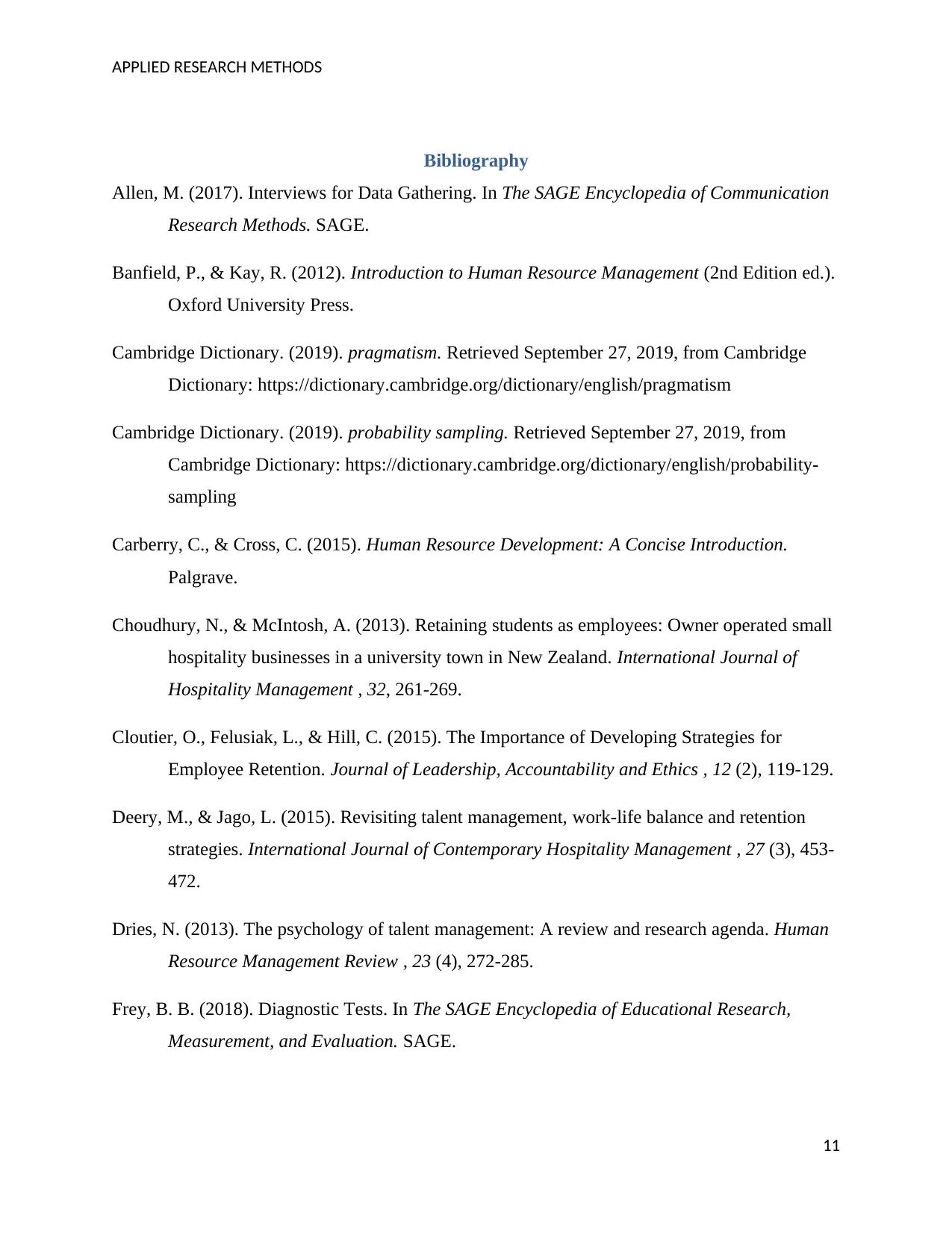
APPLIED RESEARCH METHODS
Bibliography
Allen, M. (2017). Interviews for Data Gathering. In The SAGE Encyclopedia of Communication
Research Methods. SAGE.
Banfield, P., & Kay, R. (2012). Introduction to Human Resource Management (2nd Edition ed.).
Oxford University Press.
Cambridge Dictionary. (2019). pragmatism. Retrieved September 27, 2019, from Cambridge
Dictionary: https://dictionary.cambridge.org/dictionary/english/pragmatism
Cambridge Dictionary. (2019). probability sampling. Retrieved September 27, 2019, from
Cambridge Dictionary: https://dictionary.cambridge.org/dictionary/english/probability-
sampling
Carberry, C., & Cross, C. (2015). Human Resource Development: A Concise Introduction.
Palgrave.
Choudhury, N., & McIntosh, A. (2013). Retaining students as employees: Owner operated small
hospitality businesses in a university town in New Zealand. International Journal of
Hospitality Management , 32, 261-269.
Cloutier, O., Felusiak, L., & Hill, C. (2015). The Importance of Developing Strategies for
Employee Retention. Journal of Leadership, Accountability and Ethics , 12 (2), 119-129.
Deery, M., & Jago, L. (2015). Revisiting talent management, work-life balance and retention
strategies. International Journal of Contemporary Hospitality Management , 27 (3), 453-
472.
Dries, N. (2013). The psychology of talent management: A review and research agenda. Human
Resource Management Review , 23 (4), 272-285.
Frey, B. B. (2018). Diagnostic Tests. In The SAGE Encyclopedia of Educational Research,
Measurement, and Evaluation. SAGE.
11
Bibliography
Allen, M. (2017). Interviews for Data Gathering. In The SAGE Encyclopedia of Communication
Research Methods. SAGE.
Banfield, P., & Kay, R. (2012). Introduction to Human Resource Management (2nd Edition ed.).
Oxford University Press.
Cambridge Dictionary. (2019). pragmatism. Retrieved September 27, 2019, from Cambridge
Dictionary: https://dictionary.cambridge.org/dictionary/english/pragmatism
Cambridge Dictionary. (2019). probability sampling. Retrieved September 27, 2019, from
Cambridge Dictionary: https://dictionary.cambridge.org/dictionary/english/probability-
sampling
Carberry, C., & Cross, C. (2015). Human Resource Development: A Concise Introduction.
Palgrave.
Choudhury, N., & McIntosh, A. (2013). Retaining students as employees: Owner operated small
hospitality businesses in a university town in New Zealand. International Journal of
Hospitality Management , 32, 261-269.
Cloutier, O., Felusiak, L., & Hill, C. (2015). The Importance of Developing Strategies for
Employee Retention. Journal of Leadership, Accountability and Ethics , 12 (2), 119-129.
Deery, M., & Jago, L. (2015). Revisiting talent management, work-life balance and retention
strategies. International Journal of Contemporary Hospitality Management , 27 (3), 453-
472.
Dries, N. (2013). The psychology of talent management: A review and research agenda. Human
Resource Management Review , 23 (4), 272-285.
Frey, B. B. (2018). Diagnostic Tests. In The SAGE Encyclopedia of Educational Research,
Measurement, and Evaluation. SAGE.
11
⊘ This is a preview!⊘
Do you want full access?
Subscribe today to unlock all pages.

Trusted by 1+ million students worldwide
1 out of 13
Related Documents
Your All-in-One AI-Powered Toolkit for Academic Success.
+13062052269
info@desklib.com
Available 24*7 on WhatsApp / Email
![[object Object]](/_next/static/media/star-bottom.7253800d.svg)
Unlock your academic potential
Copyright © 2020–2026 A2Z Services. All Rights Reserved. Developed and managed by ZUCOL.




